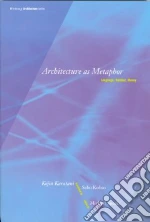Architecture As Metaphor
Book (italiano):
<P>Kojin Karatani, Japan's leading literary critic, is perhaps best known for hisimaginative readings of Shakespeare, Soseki, Marx, Wittgenstein, and most recently Kant. His works,of which Origins of Modern Japanese Literature is the only one previously translated into English,are the generic equivalent to what in America is called "theory." Karatani's writings are importantnot only for the insights they offer on the various topics under discussion, but also as an exampleof a distinctly non-Western critical intervention.In Architecture as Metaphor, Karatani detects arecurrent "will to architecture" that he argues is the foundation of all Western thinking,traversing architecture, philosophy, literature, linguistics, city planning, anthropology, politicaleconomics, psychoanalysis, and mathematics. In the three parts of the book, he analyzes the complexbonds between construction and deconstruction, thereby pointing to an alternative model of "secularcriticism," but in the domain of philosophy rather than literary or cultural criticism.As Karataniclaims in his introduction, because the will to architecture is practically nonoexistent in Japan,he must first assume a dual role: one that affirms the architectonic (by scrutinizing the suppressedfunction of form) and one that pushes formalism to its collapse (by invoking Kurt Godel'sincompleteness theorem). His subsequent discussions trace a path through the work of ChristopherAlexander, Jane Jacobs, Gilles Deleuze, and others. Finally, amidst the drive that motivates allformalization, he confronts an unbridgeable gap, an uncontrollable event encountered in the exchangewith the other; thus his speculation turns toward global capital movement. While in the presentvolume he mainly analyzes familiar Western texts, it is precisely for this reason that his voicediscloses a distance that will add a new dimension to our English-language discourse.</P>
|
Quantity
|

|
|

